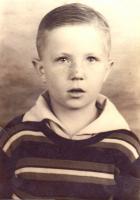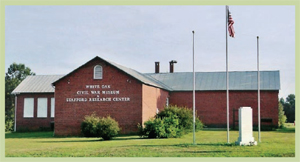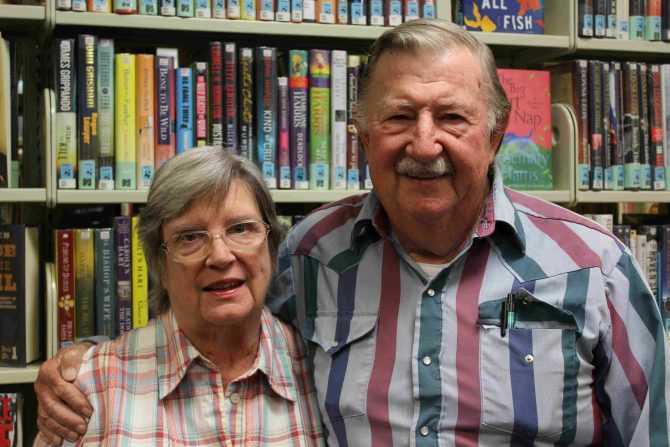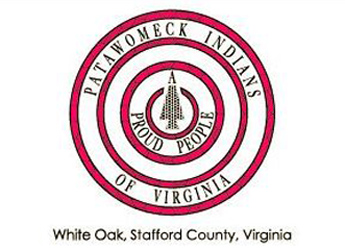This post is part of our Guest Picks series, featuring members of our library community sharing their favorite books and movies.
I was born on the banks of the Rappahannock River. Taken Home to White Oak where I was raised and educated in the World's finest three-room university, White Oak School - now known as tribal member, artisan and historian D.P. Newton's Civil War Museum. Spent my time there with the other Patawomecks during World War Two getting lessons between the sounds of the big guns being tested at Dahlgren. They rattled the windows as the concussion came up through our Land. It was the sound of Freedom fighting back. We loved it. Attended Falmouth High and graduated from Stafford High. Graduated from a little Indian School in a place once known as Middle Plantation. Turned 78 nearly a year ago. Not much else to say, except, I am known as Johnny Mac.
What did you and your friends do to enjoy summertime when you were kids?

I grew up in White Oak during World War Two. With or without the War, a White Oak Kid grew up working. It was a time when our Nation, rightfully, knew it was better for a kid to have a job, learn discipline and responsibility than be idle. Like all White Oakers we had a huge garden. At times two acres. Hogs, cows, chickens, horse, mules. You name it. I had chores such as keeping the hogs’ wallow hole in water. That is where the hogs could keep cool when the temperatures got up in the nineties and at times over a hundred.
Weeding in the garden. We started to do simple chores at age five. And were very proud to have the responsibility. Lots of time spent in the woods, streams, and river as we grew. It came naturally. We were as much a part of the land as a rabbit.
For my generation, it was World War Two. Older brothers at War, and we had to assume duties at an early age that would have been for older kids. When cows got away, chasing them at night was not fun. But we had to do it. We sat in White Oak School, a three-room frame school then, and took lessons between the shock waves sent by the testing of guns and ammo at Dahlgren. The concussions would rattle the windows. No one complained. I often wonder how my cousins down close to Dahlgren and some who lived on the Base managed. They, too, said it was a big never-you-mind.

White Oak School had no A/C. No central heat. Stoves made from 50-gallon steel barrels, wood-fired. A woodshed and the "big" boys in the fifth and sixth grades got to handle the axe and cut wood. Today, they would have jailed our teachers, parents, the school board and anyone in sight for child endangerment. What a wussy nation we have become. Ours was the real world. We did not avoid it.
Water came from a well. No indoor toilets. A boys’ and girls’ toilet at the back of the school. The girls’ toilet remnants still stand at D.P. Newton's Civil War Museum.* God help the boy who tried to go in or peek. The principal would "whup" your behind. And Momma and Daddy took turns when you got home. No phones or Internet to notify them. Wasn't needed. Some squealer was sure to tell.
We fished as often as we could. Big boys brought their shotguns and rifles to school and hunted on the way back home. A nice rabbit or two, a squirrel or two was not bad for supper.
Most homes were without electricity. Radios were powered by a battery we called a horse choker. Huge and heavy. A wire, as an aerial, went out a window to a tree or a clothesline. And it came on only at certain times. Like listening to the War news.

The reality of War came to us quickly. Blue Stars, signifying service by a Son or Daughter, too often turned to Gold. Telling of a family member who would not grace the door of home ever again. We scoured old dump sites, picked up steel and tin cans and brought them to school, piling them on the schoolyard ground. A dump truck would come down from the Court House and pick up what we had brought. Lots of farm sites got a good cleaning by White Oak Kids bringing metal to school for the War effort.
My first job off the farm and out of the community was as a carpenter's helper, with a Mister Goolrick Jett. I would meet him at 7 AM in front of my house and ride to Fredericksburg where I'm to work on buildings on William Street, in the 300 block. Two and a half story—one of the projects was removing slate from the roof. Wheelbarrowing it into a truck and dumping it. I worked for about two months and made my school clothes and book money, bought a pair of hunting boots from Montgomery and Ward, plus, a shotgun and rifle cleaning kit, which I still have. I was all of eleven, but, as I told Mr. Jett in order to make my case to be employed, very nearly 12.
I was not unusual. That was the usual for kids at that time.
What is something you would like to tell young people about Native American history?

What to tell young people about Native American History. First, Put American First. Native American is not an insult, but I like American Indian better. The Patawomecks are First Americans but most importantly Americans First. I would emphatically point out to the Young Folks that we are not a pity party. Our ancestors survived all sorts of cruelties, for none of which do they bear any responsibility nor shame. Finally, we can only be responsible for our actions and what is done going forward. American Indians do not all look alike. For the Patawomecks, it is a process of recovering our History and letting all know we will bear any burden to honor our Ancestors. I ask the Young Folks for their help. Please do not make the mistakes of the past. We are very much your neighbors. You pass us every day. We are still here.
What are your thoughts on the Patawomeck's getting official tribal recognition by the state?
Recognition gives us status, allowing us a place at the table. I thank them for being interested.
What are some of the things the Patawomecks are doing together now? What are their concerns?
One of our present and most important endeavors is recovering our language. We have been most blessed to have a member of the Mattaponi Tribe, a linguist, Army-trained and a very intelligent young man, to help us. Garry Cooper, a Patawomeck, has dedicated countless hours to this project. Another and equally important project is obtaining a place to call home. Where we can have a museum, display our artifacts, tell our History. Chief Lightner and the Tribal Council are hard at work on that project.
To all of good hearts, I leave you with a phrase borrowed from the Abenaki and Wabanaki, fellow Algonquin speakers, though another dialect.
WaNiXi—meaning: May your way be beautiful
Cweli Mayis
[Many Paths]
You can learn more about his tribe at the Patawomeck Indian Tribe of Virginia's site.
Here is a list of books Johnny Mac** recommends that are available to check out from Central Rappahannock Regional Library. The full list also includes a recommended video and website.
Also available as an eBook.
*Mr. DP Newton passed in October of 2019. His extensive collection was donated to the Virginia Historical Society, now known as the Virginia Museum of History & Culture.
**"Johnny Mac" John Chinn passed in September of 2019. He is sorely missed by his community.

